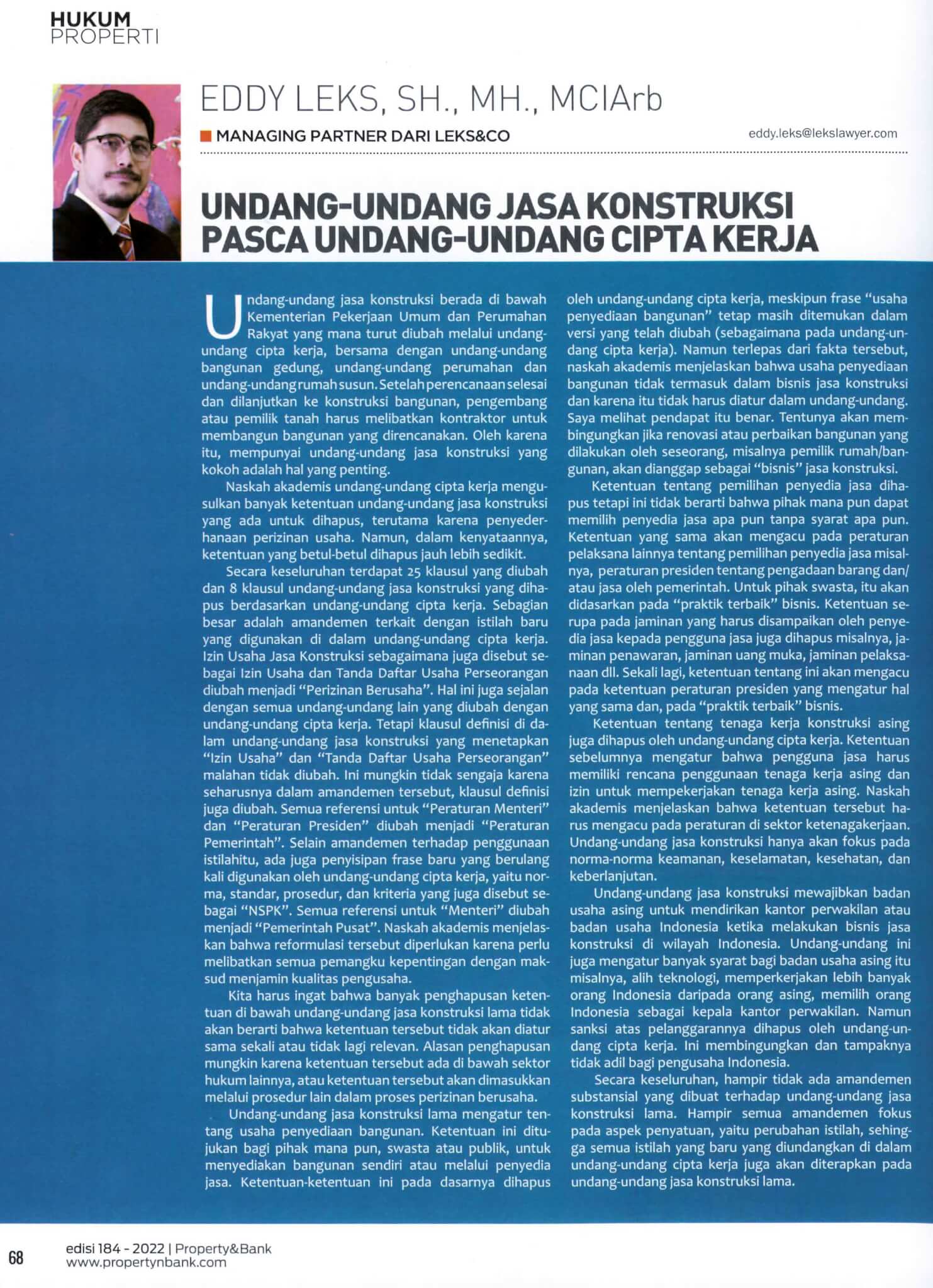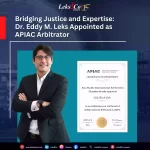Our CEO of Leks&Co wrote an article titled “Undang Undang Jasa Konstruksi Pasca Undang Undang Cipta Kerja” as published in property section of Propertynbank.com.
Construction service law is part of the ministry of public work and public housing that is also amended under job creation law, along with the building law, housing law and condominium law. After planning is completed and proceeded to building construction, the developer or landowner will have to engage a contractor to construct the planned building. Accordingly, a solid construction service law is important.
Academic script of job creation law proposes many provisions of the existing construction service law to be removed, mainly due to the simplification of business licensing. But the deleted provisions are much less in reality.
There are in total 25 amended clauses and 8 deleted clauses of construction service law under the job creation law. Most amendments are related to the new term used under the job creation law. Business License for Construction Service as is also called as Business License and Sole Proprietorship Registration are amended to “Business Licensing”, as it is also applied to all other laws amended by the job creation law. But the definition clause under the construction service law stipulating the “Business License” and “Sole Proprietorship Registration” is not amended. This might be unintentionally left behind since the definition clause should have also been amended. All references to the “Minister Regulation” and “Presidential Regulation” are amended to “Government Regulation”. Other than amendments to new term, there is also insertion on the new phrases repeatedly used by the job creation law, namely norm, standard, procedure, and criteria as is also called as “NSPK”. All references to “Minister” are amended to “Central Government”. The academic script explains that such reformulation is necessary to involve all stakeholders to secure the quality of the entrepreneurs.
One should bear in mind that many removals of provisions under the old construction service law would not mean that it will not be regulated at all or is no longer relevant. The reasons of removal may be because such provision belongs to other sector of law, or such provision will be inserted through other procedures involved in the process of business licensing.
Under the old construction service law, there is stipulation on the activity of building provision. This provision is intended for any party, private or public, to provide building by themselves or through service provider. These provisions are essentially removed by the job creation law, even though the phrase “activity of building provision” may be found in the amended version. But despite that fact, the academic script explains that the activity of building provision does not fall under the construction service business and therefore does not have to be regulated in the law. I view that that opinion is correct. It will be confusing if a renovation or repair of building made by an individual, for example the owner of a house/building, will be regarded as “business”.
The provision on the selection of service provider is removed but this does not mean that any party can choose any service provider without any conditions. The provision of the same will refer to the other implementing regulation on the selection of service provider e.g., the presidential regulation on the procurement of goods and/or services by the government. For the private party, it will be based on a business’ “best practice”. A similar provision on the guarantee that must be delivered by the service provider to the service user is also removed e.g., tender bond, advance payment bond, performance bond, etc. Again, this would refer to the presidential regulation’s provisions regulating the same and, on a business’ “best practice”.
The provision on the foreign construction worker is also removed under the job creation law. That provision regulates that the employer must have a foreign worker usage plan and license to employ foreign worker. The academic script explains that such provision will have to refer to the regulations in the employment sector. The construction service law will only focus on the norms of security, safety, health, and sustainability.
The construction service law obligates the foreign business entity to establish a representative office or Indonesian business entity when it does construction service business in the territory of Indonesia. The law also provides many conditions for that foreign business entity e.g., transfer of technology, employ more Indonesian than foreigners, selects Indonesian as head of representative office. But the penalty for its violation is removed by the job creation law. This is confusing and seems unfair for Indonesian entrepreneurs.
Overall, there is almost no substantial amendments made to the old construction service law. Almost all amendments focus on the unity aspect, namely change of term, so that all terms newly used in the job creation law will also be applied to the old construction service law.
Eddy Leks is an Indonesian lawyer, dubbed as “Highly Regarded” on M&A by IFLR1000, included as one of The A List of Indonesia’s Top 100 Lawyers by ABLJ, ranked Band 1 by Chambers and is noted “for his extensive experience in Indonesia’s real estate legal market.”
If you have any queries, you may contact us through query@lekslawyer.com, visit our website www.lekslawyer.com or visit our real estate law blogs i.e., www.hukumproperti.com and www.indonesiarealestatelaw.com








